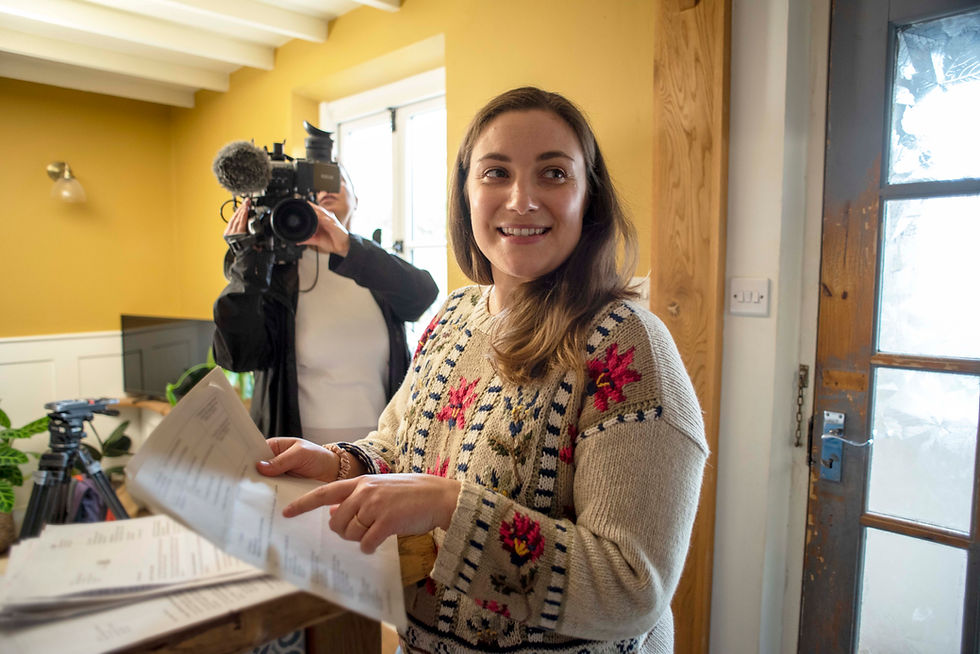"Caring Is A Double Edged Sword"
- Invisible Army

- Feb 23, 2021
- 4 min read
Pearl is a beautiful and talented woman who loves to write poetry. She is the mother of three young women, one of whom is Khemeta. When Khemeta was very young, a Health Visitor recommended she be taken to a Paediatrician. Pearl admits she didn't notice that Khemeta had special needs; she just thought she had a different character from her sister. Khemeta was later diagnosed with Autism; Out of a strong sense of love and duty Pearl provides full time care for Khemeta.


Khemeta is filled with energy; she is fast and needs constant stimulation. Pearl has carefully created a very structured and safe routine for Khemeta as this helps her feel less distressed. This routine meets each of Khemeta’s needs but can lead to Pearl having little time or energy to meet her own. Often, Pearl doesn't have time to eat until late morning, once Khemeta has left the house with her 1-1 support for the day.
Khemeta needs constant care, and Pearl is very grateful to have her other daughter Amena there when she needs her help. Amena is very busy herself studying full time at university. However, she is still happy to take part in caring for Khemeta: she feels that it is unreasonable to expect one person to provide all the care Khemeta needs alone.

Pearl: "Amena has been a Young Carer since around the age of eight. This means she has taken on certain responsibilities, at a very young age, that her peers without a sibling with special needs would not ordinarily have to do.” Amena: "Mum always asked if it was ok me helping. I always insisted that it was."
Pearl walks with Khemeta on a carefully chosen route, where the pavements are wide enough for Pearl to walk by her daughter’s side to shield her from the road, due to her lack of understanding of danger, and impulses like spinning on the spot mid walk. Pearl needs to be hypervigilant, not only because of Khemeta’s Autism, but also because of her fear of heights. She is unable to cross bridges, or to be near any drops that she is unfamiliar with. If Khemeta’s fear response is activated, she runs and may not stop until caught, which means Pearl is always thinking one step ahead while keeping right by her side.

Pearl: "When I'm out walking with Khemeta I always make sure that I wear flat shoes. This is so that, should she decide to bolt at any time, I'm already in the correct footwear to be able to run after her and grab hold of her."
Khemeta can feed herself but Pearl needs to be on guard to supervise, as Khemeta is prone to throwing food on the floor. Khemeta is non-verbal but is good at using the Makaton sign for "food" when she wants something to eat. Pearl prepares all Khemeta's food for her as she is unable to do this for herself, but Pearl does encourage her to contribute to the task, such as pouring milk into a pan and stirring or putting bread in the toaster.

Pearl's patience and encouragement have led to a clear food routine for Khemeta. Khemeta will go into the kitchen to get her food tray, then take the tray into the dining room and sit at the table. Once she has finished eating, Khemeta will take her tray and plate out into the kitchen and wash her hands and. This gives some order to what could be a stressful time of the day.
Pearl: "I see caring as a double-edged sword: On the one hand it challenges you every day to keep focused and upbeat, for the sake of your loved one, whilst, on the other, it snatches away from you any sense of independence and ties you to a life where you are always having to put yourself second."

Khemeta often sits calmly in her chair looking out of the window at the view outside, with her radio on. Her family believes this lets her know there is a whole world just outside, opening up her own world a little more. Pearl and her family feel grateful that they live in a community-focused area. When Khemeta was younger, she spent many happy hours after school and during the holidays at their local adventure playground, a stone’s throw from where they live.
Khemeta is very sensory: you will always find her with things she can fiddle with. These can be balloons, rubber bands, squidgy balls, pillows, or soft toys. These all help to keep her stimulated when she is sitting and relaxing.
Pearl: “I can only assume that caring is caring, whatever culture one may be from. The role is the same and the needs of the cared for person must still be met. For me, it's about doing the best that you can do for your loved one whilst trying to maintain some sort of balance for yourself, without reaching breaking point or burnout. Caring includes caring for oneself. That way, a person will be in a better position to care effectively.”




Comentários